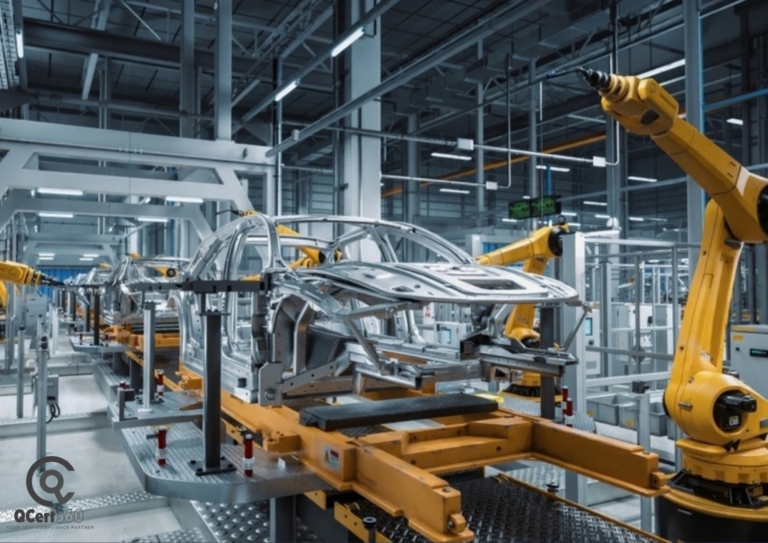
If you’re a manufacturer in Switzerland, Germany, or Austria, chances are you’re operating in one of the most quality-obsessed regions in the world. Clients don’t just expect top-tier products—they expect consistency, compliance, and a system behind the scenes that proves you’ve got your act together. That’s where ISO 9001 steps in.
Let’s break down how this internationally recognized quality management standard is helping manufacturers in the DACH region (Germany, Austria, and Switzerland) stay ahead of global competition.
Why ISO 9001 Still Matters in 2025 & years to come
Here’s the thing: ISO 9001 isn’t just a certificate you hang on the wall. It’s a framework that helps you streamline your operations, cut waste, and deliver quality every time. For Swiss manufacturers, it means keeping up with expectations in precision engineering. For German machinery companies, it’s about ensuring every component meets both technical and customer-defined standards. And for Austrian exporters, it’s the competitive edge that opens doors in foreign markets.
Even if your factory floor runs like clockwork, ISO 9001 gives potential clients—especially global buyers—the confidence that your quality isn’t a fluke. It’s a system.
ISO 9001 Certification for Swiss Manufacturers
In Switzerland, where watchmaking, medical tech, and precision tools set the bar, ISO 9001 certification for Swiss manufacturers isn’t a nice-to-have—it’s often expected. Swiss clients, especially in aerospace or pharmaceuticals, use ISO 9001 as a benchmark when vetting suppliers.
Many Swiss industrial quality management systems are already sophisticated, but ISO 9001 brings structure and international compatibility. For instance, aligning with ISO 9001 helps Swiss manufacturers integrate better with partners in the EU or US, where the standard is part of regular supplier audits.
It’s also valuable for startups and SMEs in Switzerland trying to enter export markets. Having ISO 9001 opens the door to long-term supply contracts, especially where compliance is a procurement condition.
Quality Management ISO 9001 in Germany
Germany’s manufacturing sector is massive—from automotive giants to mid-sized machinery firms. Here, quality management ISO 9001 Germany is part of business culture. Companies that want to stay on top of Germany’s competitive landscape often rely on ISO 9001 as a tool for reducing defects, improving workflows, and keeping production costs in check.
How German manufacturers stay ISO 9001 certified comes down to regular internal audits, management reviews, and strong documentation practices. There’s also a big push toward digitalization—many firms integrate ISO 9001 principles into ERP systems to automate compliance tracking.
ISO 9001 for high-tech manufacturers in Germany has become especially important with the rise of Industrie 4.0. As production gets smarter, so does quality control. ISO 9001 helps ensure all these automated processes still align with customer needs and regulatory requirements.
Austria ISO 9001 Compliance for Factories
In Austria, the landscape is slightly different. You’ll find many high-quality niche manufacturers—from energy systems to food processing equipment. For them, Austria ISO 9001 compliance for factories helps navigate strict EU standards and keep their exports flowing.
Clients abroad often ask for proof of quality systems, especially for long-term or high-volume orders. ISO 9001 competitive edge for Austrian exporters isn’t theoretical—it’s practical. When competing against larger suppliers from Germany or China, being ISO 9001 certified can tip the scale.
For small businesses, ISO 9001 support for small manufacturers in Austria is growing. Local chambers of commerce and certification bodies offer training and audit preparation to make the certification process manageable, even for firms under 50 employees.
Common Threads Across the DACH Region
So what ties these countries together when it comes to ISO 9001?
- Client Expectations Are High – Whether you’re making gears in Graz or biotech in Basel, customers expect precision.
- Export-Heavy Economies – The DACH region thrives on exports. ISO 9001 compliance reduces the friction in cross-border deals.
- Long-Term Thinking – Companies here don’t just chase revenue—they build reputations. ISO 9001 supports that long-term view.
- Talent Attraction and Retention – A documented, well-run system isn’t just for audits—it helps train new employees and reduce internal confusion.
The QMS Certification Process: Not as Painful as You Think
For companies that haven’t done it yet, ISO 9001 certification process Switzerland, Austria, or Germany usually starts with a gap analysis. From there, documentation, training, internal audits, and external audits follow. Many companies use a consultant like Qcert360 to simplify the entire journey.
If you’re a precision engineering company in Switzerland, for example, ISO 9001 doesn’t mean changing how you manufacture—just how you document, review, and improve those processes.
And for companies worried about cost, the ROI is real. ISO 9001 reduces defects, increases client satisfaction, and strengthens your brand in the eyes of global partners.
ISO 9001 Requirements for German Machinery Companies
For heavy equipment and machine builders in Germany, ISO 9001 requirements for German machinery companies aren’t just about documentation. They include:
- Clearly defined quality objectives
- Process mapping across manufacturing stages
- Performance metrics for both products and systems
- Structured customer feedback and complaint handling
These companies also face pressure from global buyers, who want assurance that parts meet standards before they arrive. ISO 9001 ensures your production lines consistently deliver what was promised.
ISO 9001 DACH Region Manufacturing Trends
In 2025, three trends are defining ISO 9001 in the DACH manufacturing space:
- Sustainability Integration – Many firms now combine ISO 9001 with environmental management (ISO 14001) to show a double commitment to quality and sustainability.
- Digital Audit Trails – Cloud-based QMS platforms are replacing paper-based systems. Audits are faster, training is easier, and updates are automatic.
- Supplier Quality Control – Manufacturers are extending ISO 9001 principles to their supply chain. This ensures consistency, even for outsourced parts or services.
Final Thoughts
ISO 9001 isn’t a generic quality stamp. For manufacturers in Switzerland, Germany, and Austria, it’s a competitive weapon. It tells buyers: “We take quality seriously, and we’ve got the systems to prove it.”
Whether you’re a large OEM, a small niche producer, or a mid-size exporter, this standard helps you win contracts, reduce rework, and stay lean.
If you’re not yet certified—or your certification is due for a refresh—Qcert360 can help you prepare, document, and pass your audit with confidence.
10 FAQs: ISO 9001 for Swiss, German & Austrian Manufacturers
- Is ISO 9001 certification mandatory in Switzerland, Germany, or Austria?
No, it’s voluntary—but highly recommended if you want to compete internationally or bid for high-value contracts. - How long does it take to get ISO 9001 certified in these countries?
Typically 3 to 6 months, depending on your company size and existing systems. - Is ISO 9001 useful for small manufacturers in Austria or Switzerland?
Absolutely. It provides structure, improves documentation, and helps with scaling operations. - Do buyers in Germany expect ISO 9001?
Many large companies require it as a baseline for supplier selection. - Can ISO 9001 help Swiss companies compete globally?
Yes. It aligns your systems with international expectations and facilitates smoother export processes. - How much does ISO 9001 certification cost in the DACH region?
Costs vary, but typically range from €3,000 to €10,000 depending on scope and company size. - Is ISO 9001 relevant for high-tech manufacturers in Germany?
Very. It ensures quality across complex, automated processes and meets client expectations in advanced industries. - What are the key ISO 9001 requirements for German machinery companies?
Clear process documentation, quality objectives, internal audits, and corrective actions. - How can companies in Switzerland prepare for ISO 9001 audits?
Gap analysis, employee training, document control, and mock audits are essential. - Does ISO 9001 improve internal efficiency or just external perception?
Both. It reduces errors, standardizes operations, and improves customer satisfaction long-term.


